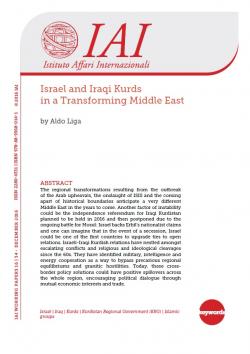Israel and Iraqi Kurds in a Transforming Middle East
The regional transformations resulting from the outbreak of the Arab upheavals, the onslaught of ISIS and the coming apart of historical boundaries anticipate a very different Middle East in the years to come. Another factor of instability could be the independence referendum for Iraqi Kurdistan planned to be held in 2016 and then postponed due to the ongoing battle for Mosul: Israel backs Erbil’s nationalist claims and one can imagine that in the event of a secession, Israel could be one of the first countries to upgrade ties to open relations. Israeli-Iraqi Kurdish relations have nestled amongst escalating conflicts and religious and ideological cleavages since the 60s. They have identified military, intelligence and energy cooperation as a way to bypass precarious regional equilibriums and granitic hostilities. Today, these cross-border policy solutions could have positive spillovers across the whole region, encouraging political dialogue through mutual economic interests and trade.
-
Details
Roma, IAI, December 2016, 19 p. -
Issue
16|34 -
ISBN/ISSN/DOI:
978-88-9368-014-1
Introduction
1. Beyond conventional alliances: Israel and Iraqi Kurdistan in the unravelling of the post-World War I order
2. Managing political isolation: “outcast nations” and foreign affairs
2.1 “Customising” the region: An independent Kurdistan in the Israeli realist security and foreign policy paradigm
2.2 Military, economic and cultural cooperation: Israel in the Iraqi Kurds’ quest for legitimacy
3. Israeli-Iraqi Kurdish relations envisioning a post-ISIS Iraq
3.1 The struggle against the Islamic State
3.2 A constrained and fragile independent Kurdistan
Conclusion: The systemic implications of the Kurdish bid for independence
References



